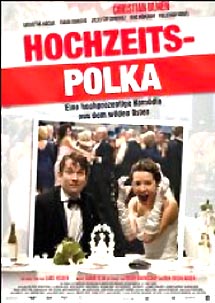
Starts September 30
 Frieder Schulz (Christian Ulmen) and his four friends play in a band called “Heide Hurricane.” They are a big hit in Itzehoe (near Hamburg), but bands don’t last forever and Frieder leaves to become the manager of a German company in the countryside of Poland. Three years later he is no longer the hippie musician, but a serious 30-year-old who practices the Polish language so that he will make a good impression at his wedding with his Polish fiancée Gosia (Katarzyna Maciag). His staid, settled life comes apart when his four friends Jonas, Paul, Knack and Manni, as well as his ex-girlfriend Ines, show up for a riotous bachelor party. From here on it’s madness with clichés about German-Polish customs, relationships and expectations.
Frieder Schulz (Christian Ulmen) and his four friends play in a band called “Heide Hurricane.” They are a big hit in Itzehoe (near Hamburg), but bands don’t last forever and Frieder leaves to become the manager of a German company in the countryside of Poland. Three years later he is no longer the hippie musician, but a serious 30-year-old who practices the Polish language so that he will make a good impression at his wedding with his Polish fiancée Gosia (Katarzyna Maciag). His staid, settled life comes apart when his four friends Jonas, Paul, Knack and Manni, as well as his ex-girlfriend Ines, show up for a riotous bachelor party. From here on it’s madness with clichés about German-Polish customs, relationships and expectations.
The film by director Lars Jessen is fine as far as it goes. I had expected much more music, but this is not a musical. There isn’t really even any wedding polka (as the title would indicate). For some reason, an American Indian hangs out in the small police headquarters. Supposedly, in the ‘60s Indians came over from the US, along with representatives of other countries, to show the Poles how to guard their borders. Therefore, supposedly a forgotten Indian is not unusual, and he has the film’s only memorable sentence. When asked why the Poles accept him (contrary to the Germans), he answers, “Because they believe that I’m not going to stay forever.”
The clichés might mean something perhaps to Germans, e.g., the town idiot saying “Heil Hitler.” Still, it’s worthwhile to stay until the end to hear the song “Eisgekühlter Bommerlunder,” which was written by Germany’s most successful group, the Toten Hosen, in 1983 about an alcoholic drink (ice cold Bommerlunder). In the film the song underlines the reconciliation of Frieder and Gosia. To test your German, you might imitate them and say Eisgekühlter Bommerlunder ten times really fast and then have a small drink of it yourself.
